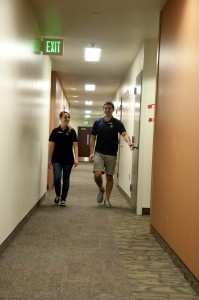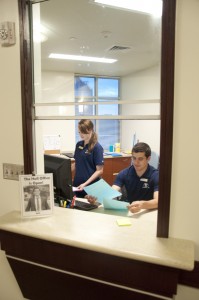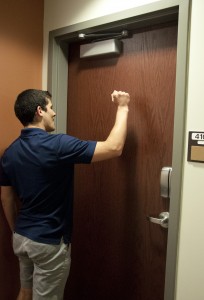
Natalie Larsen, a hall adviser for BYU Residence Life, began her career in Budge Hall of Helaman Halls, where her son, Brian, was born in the building bathroom. Her children now eat at the Cannon Center, walk around the duck pond and watch the freshmen play frisbee.
Larsen currently works in New Heritage and is a part of a team of advisers and managers who select students for resident assistant positions. She is one of many at BYU who choose to devote much of their time to work.
Resident assistants, or RAs, are seen by some as police officers, babysitters and parents, but they eat, sleep and give their lives to the ultimate “super freshman” lifestyle while enjoying the student job benefits at BYU.
A “super senior” is a student who stays in school for five years or more. A “super freshman” is a student who relives freshman year as an RA. RAs walk the halls, checking that doors are locked and students are safe. They attend leadership classes and plan dances and activities. They hold weekly floor meetings and keep up with each of the students on the floor.
“I think that some people think that the RA position is super easy to get,” Larsen said. “I think that there is a lot of behind-the-scenes work. It is a big job and a big commitment to do it well.”
What many students don’t know is that being an RA is one of the most beneficial jobs at BYU. RAs receive room and board, a meal plan and additional money for their own use.

Jordan Smith, a junior from Chino Hills, California, was an RA in New Heritage Halls during the 2013–2014 school year. Smith relived the memories of decoding campus maps and staying up until three in the morning, but this time he was watching with a new perspective as an RA.
“Most of us can remember the first time living away from home with complete strangers. Our job was to make that transition as easy as possible,” Smith said.
Hall advisors, RAs and managers devote their lives to their work, sometimes with little recognition. It is easy to overlook this primary part of BYU life because of misconceptions about freshmen and “super freshmen.” However, many students complete freshman year remembering not only the professors and the mentors, but also the RAs.
The job is more than bonuses and benefits; it is about helping students face the first-year fears while learning life skills they can use in the future.
Maddie Woodard, a freshman from Newton, Connecticut, studying special education, said she has positive experiences with her RAs as they help her adjust to living on her own.
“She’s like my mom on campus; she showed me where all my buildings were for class and walked me to church,” Woodard said.
RAs learn how to handle real-life emergencies, individual resident problems and administrative duties. From earthquake safety to depression, RAs train in a variety of topics during student leadership classes each semester.
“The craziest stuff that happened was definitely the few incidents that required police involvement. I don’t need to give out many details, but there are students at BYU who struggle with things that you would normally see at other colleges,” Smith said.
Paul Barton, a manager at Heritage Halls, has worked in Residence Life for 21 years and knows this job is more than just curfew and cleaning checks. Barton handles issues ranging from Honor Code violations to hallway pranks and building fires.
“RAs have said they can get burned out if they have a difficult floor, as they work with mental health concerns, conflicts and university policy violations,” Barton said.

Christie Anne Peterson, a freshman from Dallas, is Woodard’s roommate. Peterson said she would be an RA because of the experience and extra perks.
“I would want to be an RA because of their free housing and meal plan. They get to know a lot of people, too,” Peterson said.
RAs get to know a lot of freshmen but sometimes miss out on getting to know students their own age. Some call this job “social suicide” because of the detachment from upper-class living. RAs attend a freshman ward each Sunday with their floor and participate in their weekly activites like FHE and Y-Wednesdays.
“As I’ve talked with RAs over the years, many claim that not having a social group their own age is difficult,” Barton said.
RAs work from 8 p.m. to midnight most nights, except Fridays, where they work until 1:30 a.m. RAs also plan programs for their floor and hold hall council meetings. The time and energy required to be an RA leave little time to socialize.
Steven Fluckiger, a junior from Rexburg, Idaho, studying history, is a second-year RA in New Heritage Halls. Fluckiger chooses a more positive perspective on living in the dorms.
“Living with freshmen guys is a lot of fun; they are creative and know how to have a good time,” Fluckiger said.
Fluckiger said he doesn’t worry about the dating scene. Residence Life sees the direct effects of the missionary age change as conversations move from Friday-night dates to MTC report dates.
“It’s nice to be away from the over-dramatized BYU dating game. All the freshmen are going on missions, so the focus is on spirituality, not false notions set up by Mormon culture to get everyone married within a certain amount of time,” Fluckiger said.
Larsen is having another child at the end of this year but doesn’t plan on having another dorm-bathroom birth. As her children grow up around freshmen and RAs, Larsen looks for the right people to devote their lives to this job.
“We want RAs who can promote the residence life mission statement: we enable individuals to live, learn, work and grow in gospel-centered communities,” Larsen said.




